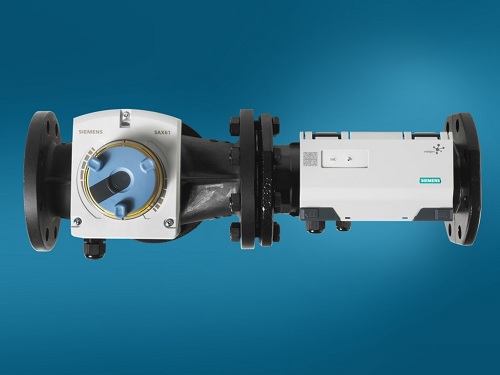The Intelligent Valve from Siemens Smart Infrastructure, a self-optimizing, dynamic valve with cloud connection, now has an Adaptive Flow Optimizer, which is unique on the market. This technology, as well as new features such as automatic presetting, continuous optimization of the delta T limitation and system-generated reports, make it possible to achieve cost and energy savings while maintaining comfort for the building occupants. For the first time, actions are autonomously evaluated and executed by the Intelligent Valve and communicated to the building operator.
“The unique Adaptive Flow Optimizer makes the Intelligent Valve more efficient and competitive than conventional pressure-independent control valves (PICV). Thanks to the automatic preset function, the valve now has the ability to automatically adjust the volumetric flow presetting during operation and to control itself. This leads up to 37% of energy savings for cooling and ventilation”, said Lu Han, Head of Business Segment Connected Devices at Siemens Smart Infrastructure”.
The built-in learning mechanism is based on system demand and avoids maximum volumetric flow when it is not required. This reduces the probability that the delta T limitation control has to intervene, which would lead to a loss of comfort. Thanks to automatic presetting, installation is quick and easy because the system does not need to have power and the installer does not have to adjust each valve multiple times. As a result, the valve supports out-of-the-box installation.

The Intelligent Valve’s self-adjustment feature makes it easy to accommodate changes of usage and, among other things, helps to continuously optimize the system and immediately detect faults and anomalies. The self-test report makes it easier to document the settings data and prove the efficiency of the system at any time. Since the report is system-generated, entry and copy errors are prevented.
In addition, the RS458 interface for connection to Modbus RTU networks facilitates integration in building automation systems and improves monitoring of operating equipment anywhere in the world.
Siemens Smart Infrastructure (SI) is shaping the market for intelligent, adaptive infrastructure for today and the future. It addresses the pressing challenges of urbanization and climate change by connecting energy systems, buildings and industries. SI provides customers with a comprehensive end-to-end portfolio from a single source – with products, systems, solutions and services from the point of power generation all the way to consumption. With an increasingly digitalized ecosystem, it helps customers thrive and communities progress while contributing toward protecting the planet. SI creates environments that care. Siemens Smart Infrastructure has its global headquarters in Zug, Switzerland. As of September 30, 2020, the business had around 69,600 employees worldwide.
Siemens AG (Berlin and Munich) is a technology company focused on industry, infrastructure, transport, and healthcare. From more resource-efficient factories, resilient supply chains, and smarter buildings and grids, to cleaner and more comfortable transportation as well as advanced healthcare, the company creates technology with purpose adding real value for customers. By combining the real and the digital worlds, Siemens empowers its customers to transform their industries and markets, to transform the everyday for billions of people. Siemens also owns a majority stake in the publicly listed company Siemens Healthineers, a globally leading medical technology provider shaping the future of healthcare. In addition, Siemens holds a minority stake in Siemens Energy, a global leader in the transmission and generation of electrical power.In fiscal 2020, which ended on September 30, 2020, the Siemens Group generated revenue of €55.3 billion and net income of €4.2 billion. As of September 30, 2020, the company had around 293,000 employees worldwide.




























